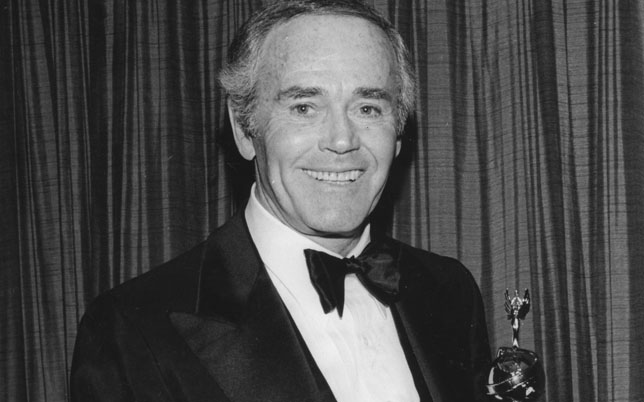
- Industry
Henry Fonda
Having started acting in the theater, which remained a lifelong passion, Henry Fonda (born May 16, 1905, died August 12, 1982), nicknamed Hank, had a long and varied Hollywood career, spanning historical dramas like Young Mr. Lincoln (1939) by John Ford, comedies like The Lady Eve (1941) by Preston Sturges, westerns like My Darling Clementine (1946) by John Ford AND political thrillers like Fail Safe (1964) by Sidney Lumet.
Interviewed by HFPA journalists in 1978, he said: “The early years as an actor were always a joy and unforgettable for all of us. There were a lot of us together in the University Players at summer-stock on Cape Cod: Josh Logan, Mildred Natwick, Margaret Sullavan (Fonda’s first wife), and a dozen others, many of them who went on to glory (like James Stewart).” Asked about favorite films he said: “It’s very difficult to say, it’s like remembering all your sweethearts and forgetting one. I am generally proud of Grapes of Wrath (1940, directed by John Ford from the novel by John Steinbeck) and The Ox-Bow Incident (1943 by William Wellman) and maybe four or five others out of the eighty-odd films I made. And probably 12 Angry Men (1957 by Sidney Lumet), because it was the one picture that I produced, so I’m proud of it as an actor and as a producer, and it won awards around the world. I like to call it my Easy Rider.” Easy Rider is, of course the 1969 film starring his actor son Peter Fonda.
And Hank was an equally proud father of his famous daughter Jane Fonda, despite some bad feelings in the family when the teenage children were not told that their mother, Fonda’s second wife Frances, had committed suicide in 1950. “There was a period that was really very short in our lives, in Jane and Peter’s and my life, in which we seemed to have a generation gap. When children decide to be what the father or mother were, they feel they have to go through a classic rebellion. I like to think I was smart enough to recognize it for what it was and let most of the hurtful things slide off; I bled and cried a little, but it didn’t last very long, because once they were successful, they were the first ones to say they were sorry and they were misquoted in the press. But those are still repeated today as legend in the Fonda family, so we learned to live with it.”
On her part Jane Fonda told HFPA journalists in 2012, that she attributes her social consciousness to having grown up with a father who made films like 12 Angry Men, Grapes of Wrath, Young Mr. Lincoln, and The Wrong Man (by Alfred Hitchcock, 1957), in which “he played people who fought for justice and for equality, who stuck up for those who weren’t so powerful. And even though he never said that to me directly, I knew those were his values.” Henry Fonda, in fact, often portrayed on screen the quiet American hero, the honest and decent man, or the unjustly accused criminal, and twice a presidential candidate, in Advise and Consent (1962) by Otto Preminger, and The Best Man (1964) from a screenplay by Gore Vidal.
The sense of fairness was instilled in young Henry by his Christian Scientist parents, William and Elma, growing up in Nebraska: “When I went East and began to meet my friends in the theater, I heard them talking about how they hated their mother and father, and I was appalled, I didn’t know what it meant, I was not brought up that way. I was very lucky that my parents loved each other and we got along, so I could grow up properly; as far as I’m concerned it’s proper to not be bigoted, not to have racial prejudice. And my father never preached, you just learned that this was the way, by osmosis at home. Jane and Peter grew up with that kind of a background as well, without being preached to. So it wasn’t difficult for me in any way when Jane became an activist, I was proud of her, from the beginning, because she was nearly thirty-years old, she wasn’t a baby, and she was already a movie star, she had been married (to Roger Vadim) and living in Paris, when she came back and lived in our home for a year.”
Henry Fonda, who was married five times in real life, acted opposite legendary Hollywood actresses like Janet Gaynor in his screen debut, The Farmer Takes a Wife (1935) by Victor Fleming, Sylvia Sidney in You Only Live Once (1937) by Fritz Lang, Bette Davis in That Certain Woman (1937) and Jezebel (1939) by William Wyler, Joan Crawford in Daisy Kenyon (1947), but his favorite was Barbara Stanwyck, his costar in The Mad Miss Manton (1938), You Belong to Me (1941), and the marvelous The Lady Eve (1941). “I was in love with Barbara Stanwyck,” he later declared, “I did three movies with her. Everything I did with her was something I love to remember. And I’m still in love with her, my wife has learned to live with it…” In failing health after heart trouble in his later years, Fonda was able to complete a film with his daughter Jane and Katherine Hepburn, On Golden Pond (1981) directed by Mark Rydell, about the reconciliation between a father and his adult daughter.
The following year it was Jane, with her father’s fifth wife Shirlee, who accepted his Golden Globe for Best Actor in 1982. The Hollywood Foreign Press had honored him with a Cecil B. deMille Life Achievement Award in 1980 and had nominated him as Best actor for 12 Angry Men in 1958.